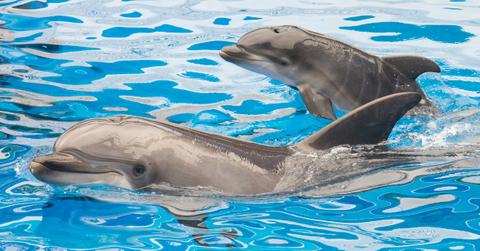
California bill could shut down SeaWorld by banning dolphin and whale captivity
By Sophie HirshMarch 4 2020, Updated 12:48 p.m. ET
California could soon ban marine mammal captivity, should the recently-proposed Dolphin Protection Act become law. As pointed out by LiveKindly, the bill would effectively shut down SeaWorld San Diego (the first of four SeaWorld locations on Earth), where dolphins and whales are kept in captivity, forced to perform tricks, and subjected to endless other behaviors against their nature.
Senator Cathleen Galgiani (D-Stockton) is sponsoring the Dolphin Protection Act, also known as Senate Bill 1405. As Galgiani explains in the bill's abstract, there is currently a law protecting orcas (aka killer whales) from being bred, held in captivity, used for entertainment, and more in California. Her bill would expand the law to protect all cetaceans (whales, dolphins, and porpoises) from the same activities across the state.
According to a press release by Animal Hope in Legislation, an animal welfare reform organization that is sponsoring the bill, the Dolphin Protection Act would allow for a transition period so that SeaWorld could provide a "humane future" for the animals. Ultimately, the goal of this bill seems to be to transition facilities like SeaWorld to sanctuaries for the cetaceans that are already there as well as for stranded wild cetaceans. The bill would let cetacean holding facilities rescue, rehabilitate, and return wild animals to the ocean.
“We should not rely on cruel and inhumane treatment of any creature simply for our entertainment,” Senator Galgiani said in a statement. “Dolphins are incredibly intelligent beings that suffer a range of health problems and stress as a result of being held in captivity.”
Unfortunately, behind all the flashy shows at SeaWorld, there is a lot of pain. At SeaWorld, cetaceans live in tanks that are essentially bathtubs — whereas in the wild, marine mammals can swim up to 100 miles a day. An orca at SeaWorld would have to swim around his or her tank 1,400 times to achieve that distance, according to Whale and Dolphin Conservation.
In the wild, cetaceans are social animals, spending most of their time with their families — but at SeaWorld, they are isolated in tanks, where they can only interact with a few other animals who are typically not from their families or even their species (as well as human staffers — most of whom are performers, not marine biologists), Whale and Dolphin Conservation added.
Living in isolation has effects on cetaceans not unlike the effects that living in isolation might have on a human — that's why experts have coined the neurotic condition "zoochosis," which is when living in captivity causes animals frustration, boredom, depression, increased aggression, self-mutilation, and more, according to Your Daily Vegan.
Animals held captive at SeaWorld are forced to perform tricks that go against their nature; the animals typically suffer from perpetual sunburns since their tanks don't allow them to go as deep underwater as they would in nature; and orcas often develop collapsed dorsal fins, according to SeaWorld of Hurt. All of these factors reduce the lifespans of these animals — as per SeaWorld of Hurt, orcas can live to 100 years of age in the wild, but on average, orcas at SeaWorld have a lifespan of about 14 years.
“Society’s attitudes about keeping certain animals in captivity has changed,” said Marc Ching, founder of Animal Hope in Legislation. “We cannot continue to bring whales and dolphins into captivity where they will spend their entire lives in a concrete tank. California is a leader in animal welfare policy and thanks to Senator Galgiani’s bill, many of these animals will be able to stay where they belong, in the wild.”
Should the Dolphin Protection Act become law, it would be huge for the state of California. Pushback is to be expected, but no matter the outcome, it's encouraging to know that there are lawmakers fighting for these animals.
